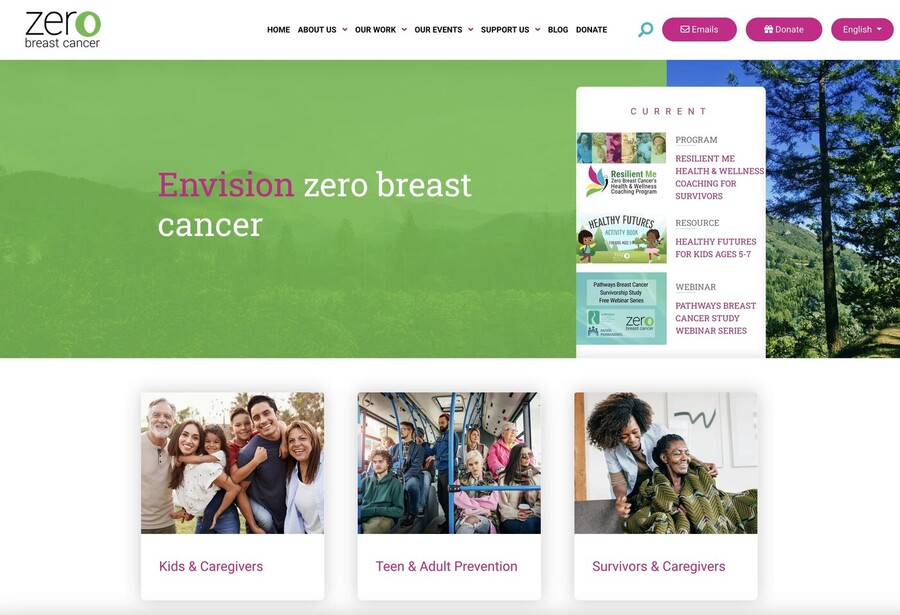The Collaborative for Health & Environment (CHE) had an exciting expansion in August 2024. After 28 years as an independent nonprofit, Zero Breast Cancer (ZBC) joined CHE. I spent seven years leading programs at ZBC, and I’m thrilled to continue my role leading this work at CHE and ensuring continuity and expansion in programs.
In this post I’m providing a brief overview of ZBC’s programs for those in the CHE community who aren’t familiar with our work. I’ll be following up in future with deeper dives into specific areas of work.
A legacy of prevention
But first, a bit of history. ZBC was founded in 1996 as Marin Breast Cancer Watch (MBCW) with a focus on exploring the role environmental chemicals had in the high rates of breast cancer in Marin County, CA, which had the highest incidence of breast cancer in the world at the time.
When rates in Marin began to decline, MBCW reoriented as Zero Breast Cancer and added new programs promoting integrative health and wellness. These new activities expanded the group’s historical focus on limiting exposure to toxic chemicals to include addressing other breast cancer risk factors like physical activity, sleep, stress management, and healthy diet.
ZBC continues to partner closely with researchers exploring the drivers of breast cancer risk and recurrence risk. We seek to ensure that community perspectives are represented in research and that findings are disseminated to the public in formats that are actionable and easy to understand. Almost all resources are available in English and Spanish, with some in Chinese, Tagalog, and French. Both next generation breast cancer risk reduction and survivorship support have a long history of being prioritized at ZBC.
Next generation primary prevention
All of ZBC’s work is grounded in breast cancer survivors’ priorities. We know that no one is more committed to preventing breast cancer for others than people who have experienced the disease.
ZBC research partners have contributed to a large body of work that clearly shows that starting breast cancer prevention efforts young can make a tremendous difference. Breast cancer risk is shaped in the earliest phases of life, including during egg development, fetal development, and infancy. This is why we developed the Generations/Generaciones campaign, which primarily targets young adults pre-pregnancy — although it is also shared with everyone teens and older. In this project, we focus on limiting exposure to toxic chemicals that can increase breast cancer risk for the person exposed, their children, and even their grandchildren.
Pre-puberty and pubertal development are also key to lifetime breast cancer risk. While breasts are developing, they are more susceptible to both protective factors (things that make breast cancer less likely) and risk factors (things that make breast cancer more likely).
Our Healthy Futures/Futuros saludables activity book for kids ages 5-7 has encouraged over 5,000 children to take healthy actions pre-puberty to promote lifelong health and wellness. This includes steps promoting physical activity, sleep, stress management, and healthy eating. Our Girls’ New Puberty/La niñas y la nueva pubertad resources that are for parents and caregivers of young girls also include information on limiting exposure to toxic chemicals.
For older audiences, our 13 Ways to Reduce Your Risk of Breast Cancer/13 formas de disminuir el riesgo de tener cáncer de mama brochures, posters, and webpage are shared with teens and adults to highlight both lifestyle and environmental exposure reduction steps a person can take to reduce their lifetime risk of breast cancer.
Wellness resources for survivors
Our health and wellness resources for survivors include factsheets on memory and thinking problems, neuropathy, and heart health. ZBC also hosts webinars highlighting key topics for breast cancer survivors.
The current series is about Pathways research results and pairs researchers and clinicians to inform survivors and caregivers of the latest research findings on breast cancer recurrence risk and other health and wellness topics.
I’m particularly excited about our new Resilient Me Health & Wellness Coaching, which is our first direct service for survivors. Piloted in March 2024, it is now an established program providing breast cancer survivors with 12 weeks of free, 1:1 personalized sessions. Coaches are certified health and wellness professionals who have graduated from a National Board for Health & Wellness Coaches-approved training program.
Survivors select their own priority to focus on during the program. They can choose to work on one or more breast cancer recurrence risk reduction measures, including physical activity, diet, sleep, stress management, and limiting exposure to toxic chemicals. The response to this program has been incredibly positive.
Moving forward, together
ZBC’s work is strengthened in our new home, and we also bring our strengths to CHE.
We are currently community partners in three studies exploring chemical exposures and breast cancer risk, including Black women’s increased risk, the role of sperm in multigenerational risk transmission, and the impact of chemical mixtures. We are creating blog articles and videos that will inform the public of findings and actions that can be taken to reduce risk.
CHE’s Senior Science and Policy Advisor Rachel Massey, ScD, will enhance this work by adding an in-house scientific perspective to the development of these resources. My experience communicating scientific findings to affected individuals will expand CHE’s established focus on disseminating findings to researchers and policy-makers.
I look forward to being part of the team moving this collective work forward, at a time when primary cancer prevention and risk reduction is more important than ever.
Lianna led programs at Zero Breast Cancer (ZBC) for seven years before the organization became a project of CHE in 2024. She is a National Board-Certified Health and Wellness Coach (NBC-HWC) after receiving training and certification at Emory University. Prior to joining ZBC, she had over a decade of experience as a sociological researcher and educator. Her expertise is in qualitative health research; she has studied bone marrow donation, dying in hospitals, and mothering children with autism. Lianna earned her M.A. and C.Phil. in Sociology with a concentration in Gender Studies at the University of California, Los Angeles.


